

M.youtube. Dogma. Www.merriam-webster. Groundwork of the Metaphysic of Morals. Groundwork of the Metaphysics of Morals (German: Grundlegung zur Metaphysik der Sitten; 1785; also known as the Foundations of the Metaphysics of Morals, Grounding of the Metaphysics of Morals and the Grounding for the Metaphysics of Morals) is the first of Immanuel Kant's mature works on moral philosophy and remains one of the most influential in the field.
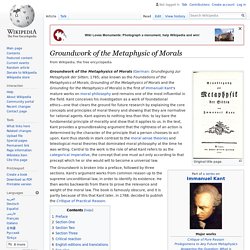
Kant conceives his investigation as a work of foundational ethics—one that clears the ground for future research by explaining the core concepts and principles of moral theory and showing that they are normative for rational agents. Kant aspires to nothing less than this: to lay bare the fundamental principle of morality and show that it applies to us. In the text, Kant provides a groundbreaking argument that the rightness of an action is determined by the character of the principle that a person chooses to act upon. The Groundwork is broken into a preface, followed by three sections. The Metaphysics of Morals. The Metaphysics of Morals (German: Die Metaphysik der Sitten) is a 1797 work of political and moral philosophy by Immanuel Kant.
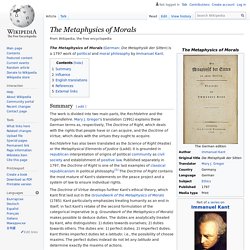
Summary[edit] The work is divided into two main parts, the Rechtslehre and the Tugendlehre. Mary J. Gregor's translation (1991) explains these German terms as, respectively, The Doctrine of Right, which deals with the rights that people have or can acquire, and the Doctrine of Virtue, which deals with the virtues they ought to acquire. Www.britannica. John Locke, (born August 29, 1632, Wrington, Somerset, England—died October 28, 1704, High Laver, Essex), English philosopher whose works lie at the foundation of modern philosophical empiricism and political liberalism. He was an inspirer of both the European Enlightenment and the Constitution of the United States.
His philosophical thinking was close to that of the founders of modern science, especially Robert Boyle, Sir Isaac Newton, and other members of the Royal Society. Www.iep.utm. John Locke was among the most famous philosophers and political theorists of the 17th century.
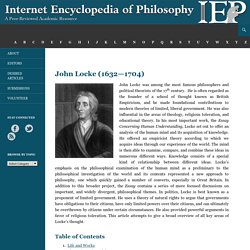
He is often regarded as the founder of a school of thought known as British Empiricism, and he made foundational contributions to modern theories of limited, liberal government. He was also influential in the areas of theology, religious toleration, and educational theory. In his most important work, the Essay Concerning Human Understanding, Locke set out to offer an analysis of the human mind and its acquisition of knowledge. He offered an empiricist theory according to which we acquire ideas through our experience of the world. The mind is then able to examine, compare, and combine these ideas in numerous different ways. John Locke. John Locke FRS (/ˈlɒk/; 29 August 1632 – 28 October 1704), was an English philosopher and physician regarded as one of the most influential of Enlightenment thinkers and known as the "Father of Classical Liberalism".[1][2][3] Considered one of the first of the British empiricists, following the tradition of Sir Francis Bacon, he is equally important to social contract theory.
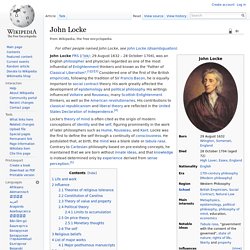
His work greatly affected the development of epistemology and political philosophy. His writings influenced Voltaire and Rousseau, many Scottish Enlightenment thinkers, as well as the American revolutionaries. His contributions to classical republicanism and liberal theory are reflected in the United States Declaration of Independence.[4] Life and work Locke's father, also called John, was a country lawyer and clerk to the Justices of the Peace in Chew Magna,[6] who had served as a captain of cavalry for the Parliamentarian forces during the early part of the English Civil War. Influence. Hecuba. Spouse of king Priam in Greek mythology Parentage[edit] According to Suetonius in The Twelve Caesars, the emperor Tiberius pestered scholars with obscure questions about ancient mythology, with one of his favorites being "Who was Hecuba's mother?
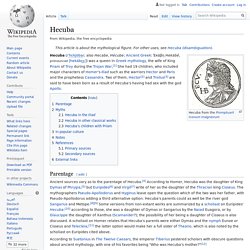
" Definition of Apodictic by Merriam-Webster. Definition of Apodictic by Merriam-Webster. Transcendental analytic. Kant's Critique of Metaphysics. 1. Kant’s First Critique: The Transcendental Analytic. Kant’s chapter on the Transcendental Analytic is concerned with the positive role of reason.
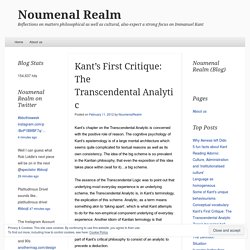
The cognitive psychology of Kant’s epistemology is of a large mental architecture which seems quite complicated for textual reasons as well as its own consistency. The idea of the big scheme is so prevalent in the Kantian philosophy, that even the exposition of this idea takes place within (wait for it)…a big scheme. The essence of the Transcendental Logic was to point out that underlying most everyday experience is an underlying scheme, the Transcendental Analytic is, in Kant’s terminology, the explication of this scheme. Analytic, as a term means something akin to ‘taking apart’, which is what Kant attempts to do for the non-empirical component underlying of everyday experience. TRANSCENDENTAL LOGIC. TRANSCENDENTAL analytic consists in the dissection of all our a priori knowledge into the elements that pure understanding by itself yields.
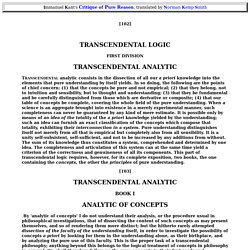
In so doing, the following are the points of chief concern: (1) that the concepts be pure and not empirical; (2) that they belong, not to intuition and sensibility, but to thought and understanding; (3) that they be fundamental and be carefully distinguished from those which are derivative or composite; (4) that our table of concepts be complete, covering the whole field of the pure understanding. When a science is an aggregate brought into existence in a merely experimental manner, such completeness can never be guaranteed by any kind of mere estimate. Kant's Transcendental Arguments. 1.
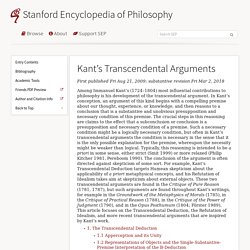
The Transcendental Deduction The Transcendental Deduction (A84–130, B116–169) is Kant’s attempt to demonstrate against empiricist psychological theory that certain a priori concepts correctly apply to objects featured in our experience. M.youtube. Kant%20CPR%20Ch2. Phenomenological Interpretation of Kant's Critique of Pure Reason - Martin Heidegger - Google Books. The Critique of Pure Reason: Base Plan for Transcendental Philosophy: One of ... - Immanuel Kant - Google Books. Definition of Didactic by Merriam-Webster. Didactic vs. Pedantic. Didactic and pedantic: they're both connected to teaching, but teachers will likely object to being described with either one.

Didactic can have a neutral meaning of "designed or intended to teach people something," but often didactic is used when the lesson being taught is annoying or unwanted—such as an attempt to school people on what's proper or moral. Describing a person as "didactic" is almost never a compliment; describing something written or made by a person usually isn't either. In educational settings, though, didactic can describe a kind of instruction that involves lectures and textbooks only, as opposed to laboratory or clinical work. Or it can be applied in technical contexts dealing with theories of teaching. It can also describe literature or art that is meant to instruct as well as to entertain and please, such as didactic poetry. Pedantic is used more narrowly. Didactic method. A didactic method (Greek: διδάσκειν didáskein, "to teach") is a teaching method that follows a consistent scientific approach or educational style to present information to students.
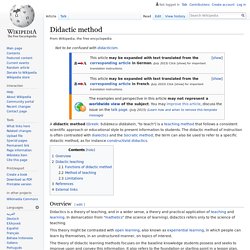
The didactic method of instruction is often contrasted with dialectics and the Socratic method; the term can also be used to refer to a specific didactic method, as for instance constructivist didactics. Overview[edit] Didactics is a theory of teaching, and in a wider sense, a theory and practical application of teaching and learning. In demarcation from "mathetics" (the science of learning), didactics refers only to the science of teaching. This theory might be contrasted with open learning, also known as experiential learning, in which people can learn by themselves, in an unstructured manner, on topics of interest. Didactic. English[edit] Alternative forms[edit] didactick (obsolete) Definition of Pedantic by Merriam-Webster. Pedantic. [puh-dan-tik] See more synonyms for pedantic on Thesaurus.com ostentatious in one's learning.overly concerned with minute details or formalisms, especially in teaching.
Also Archaic, pe·dan·ti·cal. Pedantic. Pedantic - Dictionary Definition. Pedant. Person obsessed with detail or process, often negatively perceived Personality[edit] Pedantry is related to personality. Plutarch. Plutarch (/ˈpluːtɑrk/; Greek: Πλούταρχος, Ploútarkhos, Koine Greek: [plǔːtarkʰos]; later named, on his becoming a Roman citizen, Lucius Mestrius Plutarchus (Λούκιος Μέστριος Πλούταρχος);[a] c. 46 – 120 AD),[1] was a Greek historian, biographer, and essayist, known primarily for his Parallel Lives and Moralia.[2] He is considered today to be a Middle Platonist.
Early life[edit] Persius. Persius, in full Aulus Persius Flaccus (; 4 December 34, in Volterra – 24 November 62), was a Roman poet and satirist of Etruscan origin. In his works, poems and satires, he shows a stoic wisdom and a strong criticism for what he considered to be the stylistic abuses of his poetic contemporaries. His works, which became very popular in the Middle Ages, were published after his death by his friend and mentor, the stoic philosopher Lucius Annaeus Cornutus. Aristotle, Metaphysics, Book 1, section 980a. Text?doc=Perseus%3Atext%3A1999.01. [1072b] [1] and that which is first in a class is always best or analogous to the best. Lectures on Metaphysics and Logic - Sir William Hamilton - Google Books. The Varieties of Metaphysical Poetry - T. S. Eliot - Google Books.
Skepticism. Idealism. The 20th-century British scientist Sir James Jeans wrote that "the Universe begins to look more like a great thought than like a great machine. " Beginning with Immanuel Kant, German idealists such as G. Imagination. Imagination is the capacity to produce images, ideas and sensations in the mind without any immediate input of the senses (such as seeing or hearing). Imagination helps make knowledge applicable in solving problems and is fundamental to integrating experience and the learning process.[1][2][3][4] A basic training for imagination is listening to storytelling (narrative),[1][5] in which the exactness of the chosen words is the fundamental factor to "evoke worlds".[6] Imagination is a cognitive process used in mental functioning and sometimes used in conjunction with psychological imagery.
Anthropomorphism. Personification is the related attribution of human form and characteristics to abstract concepts such as nations, emotions, and natural forces, such as seasons and weather. Both have ancient roots as storytelling and artistic devices, and most cultures have traditional fables with anthropomorphized animals as characters. People have also routinely attributed human emotions and behavioural traits to wild as well as domesticated animals.[3] Definition of Anthropomorphic by Merriam-Webster.
Anthropomorphism. When you talk to your dog, your computer, your teddy bear, or your car as if you were speaking to another person, you are anthropomorphizing—or attributing human characteristics like emotions and intent to a non-human entity. Anthropomorphism is a universal mental process—pretty much everyone does it—but research shows that the degree to which individuals anthropomorphize can have significant consequences in their lives. Ascribing human qualities to inanimate objects is generally associated with innocuous, often positive effects like "cuteness," humor, empowerment, and a mature sense of responsibility.
Kant, Immanuel: Philosophy of Religion. Definition of Propaedeutic by Merriam-Webster. Propaedeutics. A priori and a posteriori. Definition of A Priori by Merriam-Webster. A Priori and A Posteriori. Definition of A Posteriori by Merriam-Webster. A posteriori. A posteriori knowledge. Diogenes Laërtius. Diogenes Laertius. 5752152. Proposition. Definition of Proposition by Merriam-Webster. Thales of Miletus. Thales of Miletus. Thales's theorem. Thales of Miletus > By Individual Philosopher > Philosophy. Thales of Miletus - philosophers.co.uk. Nature of Mathematics. Thales of Miletus. Francis Bacon. Natural science. Galileo Galilei. Evangelista Torricelli. Cavalieri's principle. Barometer. Torricelli's law. Two New Sciences. Grand Duchy of Tuscany. Vacuum. Atmospheric pressure.
Stall torque. Torque Converters, Stall Torque Converter, Performance Torque Converter, Monster Torque Converter. Kant, Immanuel: Metaphysics. Kantmet. Definition of Supersensible by Merriam-Webster. Supersensible. Supersensible. Speculative reason. Definition of Speculative Reason by Merriam-Webster. Www.practicalcognition.com. Definition of Posterity by Merriam-Webster. Definition of Speculative Reason by Merriam-Webster. Practical Reasoning. In philosophy, what is the meaning of a 'speculative reasoning' and how does it differ from a practical reasoning? M.youtube. Phenomenal Physics - J. Russell Harkay Ph.D., J Russell Harkay - Google Books.
Critique-of-pure-reason. Two modes pf reperse tation the sensible and the intellectual - Google-Suche. Socratic method. Definition of Socratic Method by Merriam-Webster. Kantethx_120. Thinkingmatters.org. The Kantian Imperative: Humiliation, Common Sense, Politics - Paul Saurette - Google Books. Auslegung.v11.n02.481-492. Section-2.
Definition of Subjective by Merriam-Webster. Objective vs. subjective : Choose Your Words.